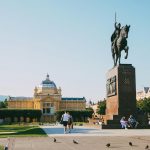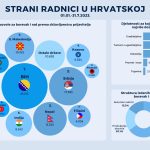An exciting political year awaits.
Solving the border dispute with Slovenia, preparation for entry into the Schengen Area, pension and education system reforms, completion of Agrokor’s extraordinary administration, purchase of INA shares from Hungarian MOL, beginning of the construction of the Pelješac Bridge, acquisition of new combat aircraft – these are just some of the most critical challenges that will be met by the government in 2018, which will follow equally interesting 2017, reports tportal.hr on January 1, 2018.
The first significant problem Prime Minister Andrej Plenković will have to face is the resolution of the border dispute with Slovenia, which has decided to implement the decision of the arbitration tribunal on the sea, in the Bay of Piran. While Plenković called on Slovenia to refrain from unilateral moves, his Slovenian counterpart Miro Cerar is under tremendous internal political pressure that Slovenia must establish sovereignty over the part of the bay which it was awarded by the arbitration decision which Croatia does not accept.
The government will also soon make the final decision on the selection of the bidder from which Croatia will acquire a new squadron of combat aircraft. The favourites are Swedish Gripen and Israeli F-16.
Plenković plans to strengthen Croatia’s international position by bringing Croatia closed to the Schengen Area and the membership in the Organization for Economic Co-operation and Development (OECD). Plenković’s political goal is for Croatia to be ready to enter the Schengen Area in 2019, but a precondition for achieving this strategic goal is the agreement with Slovenia on the border.
Croatia’s accession to the OECD will not happen before Croatia resolves the INA-MOL problem with Hungary. The controversy surrounding the issue was politically settled in Budapest when Hungarian Prime Minister Viktor Orban said, after a meeting with Plenković, that Croatia had the political support of his government to renationalise INA. However, equally important, Orban made clear that he expected from Croatia a good offer to buy MOL’s shares in INA. Although the government has recently made a decision to seek international advisers to assist in the purchase of INA shares and finding a new strategic partner, Plenković and ministers are yet to make the most difficult decisions in this process.
The construction of the Pelješac Bridge has been turned over time into the ultimate strategic goal. But, who will build the bridge, at what price, when the construction will start and when it will end – that is still not known. The latest obstacle occurred a month ago when a company filed a complaint about the tender for supervision of construction works.
The year ahead is probably the final chance for Plenković to try to implement significant reforms. In 2018, except in the unlikely case of the fall of Plenković’s government, there will be no national elections – which are always used as an excuse not to do anything.
A year without elections is the excellent opportunity for reforms, which has been at least verbally recognised by the Prime Minister himself. He announced that 2018 would be the year of reforms, and he mentioned a pension reform as one of the critical challenges. In the plan of legislative activities for this year, the government has included amendments to the Law on Pension Insurance. What will change is not yet known, but the direction in which it will change is – the government will want people to work longer, it will financially punish those opting for early retirement, and it is possible that allocation for the second pension pillar will be increased.
The reform of the education system should finally start. The plan is to begin its pilot phase from the 2018/2019 school year. Prime Minister Plenković appointed himself to lead the commission for the implementation of the education strategy. In January, the process for selecting the curricular reform expert group members will start.
During this year, Finance Minister Zdravko Marić will have to find a politically acceptable model for the introduction of property taxes. The property tax was due to take effect from today, but the Prime Minister decided to delay it after public outcry.
Ministers speak continuously about the demographic renewal of the country, and therefore all eyes will be turned towards Minister for Demography, Family, Youth and Social Affairs Nada Murganić. She said that about a billion kunas would be allocated for demography initiatives and announced an increase in maternity and parental benefits, in the number of beneficiaries of child allowance and substantial investments based on EU funds in the construction and renovation of kindergartens.
The political fate of Plenković and his government depends to a large extent on the outcome of the Agrokor crisis. The government has adopted “Lex Agrokor”, appointed an extraordinary commissioner and the entire process should end with a settlement with vendors and lenders – no later than 10 July. Major problems appeared at the very beginning of the negotiation process, with Agrokor’s suppliers literally tearing apart the proposed plan.
In any case, although no elections are expected, it will be a politically fascinating year.
Translated from tportal.hr.







